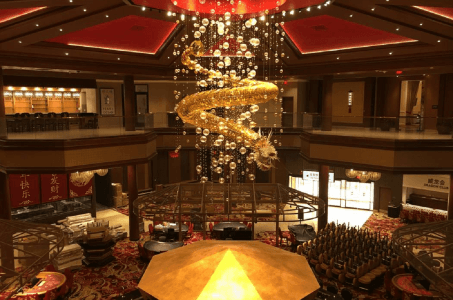Las Vegas Sands Stock Could Be Rising Rates Beneficiary
Posted on: October 28, 2021, 09:39h.
Last updated on: October 28, 2021, 02:17h.
While off the high of 1.67 percent touched last week, ten-year Treasury yields are up 22.68 percent over the past three months. That’s prompting investors to consider assets that perform well against the backdrop of rising rates. Las Vegas Sands (NYSE:LVS) stock fits the bill.

The gaming equity’s penchant for sturdiness as 10-year yields rise is worth remembering, because Bank of America strategists are forecasting a jump to two percent for those bond yields by the end of 2022. Ten-year yields reside at 1.548 percent at this writing.
The Bank of America team ran a screen of S&P 500 members that were helped the most by increasing nominal 10-year yields from 1972 through September 2021, with Las Vegas Sands appearing on the list.
Screens are based on a regression of stocks’ monthly excess returns vs. monthly changes in the nominal 10-year yields, including only those stocks with beta (slope) that is statistically significant at the 5 percent level, and who have at least 10 years of monthly returns,” according to the bank.
LVS stock, which is rated “neutral” by Bank of America, has a nominal interest rate beta of 14.2, good for the fifth spot on the list. It’s the only gaming equity in the group.
Waiting on LVS Stock to Benefit
Amid the recent spike in 10-year yields, LVS isn’t proving too responsive, gaining just 1.65 percent over the past three months.
That’s likely a symptom of a sluggish recovery in Macau – the company’s largest market. Sands China runs five integrated resorts in the world’s biggest gaming center. That makes it vulnerable to recent speculation that authorities there are looking to implement tighter controls over the casino industry.
Shares of US-based Macau operators, including Sands, have also been hampered by speculation that those companies could be ensnared in the geopolitical tensions between the US and China. But market observers and the operators themselves appear comfortable saying licenses will be renewed.
The prevailing wisdom among many in the investment community is that Macau’s gaming industry, while the largest in the world, is of little consequence in the broader scheme of hostilities between the world’s two largest economies. They claim that Beijing has no intention of leveraging casinos as a show of aggression toward the US.
Add it all up, and despite a prior spike in Treasury yields that lasted well into the second quarter, LVS stock is lower by 32.38 percent year-to-date. That prompted some analysts to say management should unleash a big buyback program to restore shareholder confidence and show investors the stock is undervalued.
Inflation Might Not Be a Problem
The combination of hot inflation and rising interest rates is often toxic for equities. But the broader market isn’t being hampered by that scenario this year.
As higher readings of the Consumer Price Index (CPI) pertain to gaming equities, including LVS, conventional wisdom is that consumer discretionary — the sector where casino stocks reside — is among the groups most vulnerable to soaring inflation.
As the script goes, higher energy costs and reduced purchasing power due to higher prices in general eat away at nonessential consumer spending,” according to Charles Schwab research.
Sands might be able to contend with persistent inflation for a simple reason: The CPI is a domestic gauge and the company currently has no operations in the US.
Related News Articles
Hard Rock International Wins Right to Build Ottawa Casino
Hard Rock Atlantic City Distributes $10M in Employee Bonuses on Record Year
Casino Stocks Among Q3 Consumer Discretionary Leaders
Most Popular
Genovese Capo Sentenced for Illegal Gambling on Long Island
VEGAS MYTHS RE-BUSTED: The Strip is the Brightest Place on Earth
UPDATE: Former Resorts World & MGM Grand Prez Loses Gaming License
Jackpot News Roundup: Two Major Holiday Wins at California’s Sky River Casino
VEGAS MYTHS RE-BUSTED: The Traveling Welcome to Las Vegas Sign
Most Commented
-
UPDATE: Whiskey Pete’s Casino Near Las Vegas Closes
— December 20, 2024 — 33 Comments -
Zillow: Town Outside Las Vegas Named the Most Popular Retirement City in 2024
— December 26, 2024 — 21 Comments -
Caesars Virginia in Danville Now Accepting Hotel Room Reservations
— November 27, 2024 — 9 Comments -
UPDATE: Former Resorts World & MGM Grand Prez Loses Gaming License
— December 19, 2024 — 8 Comments
















No comments yet